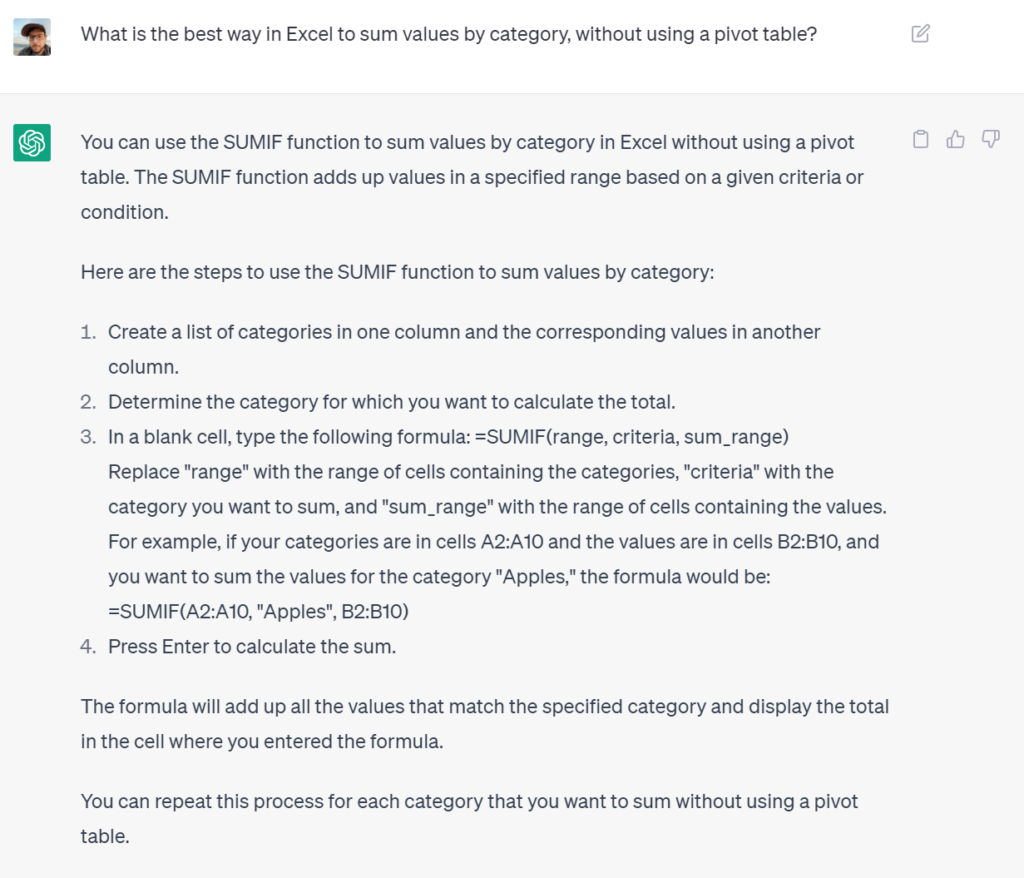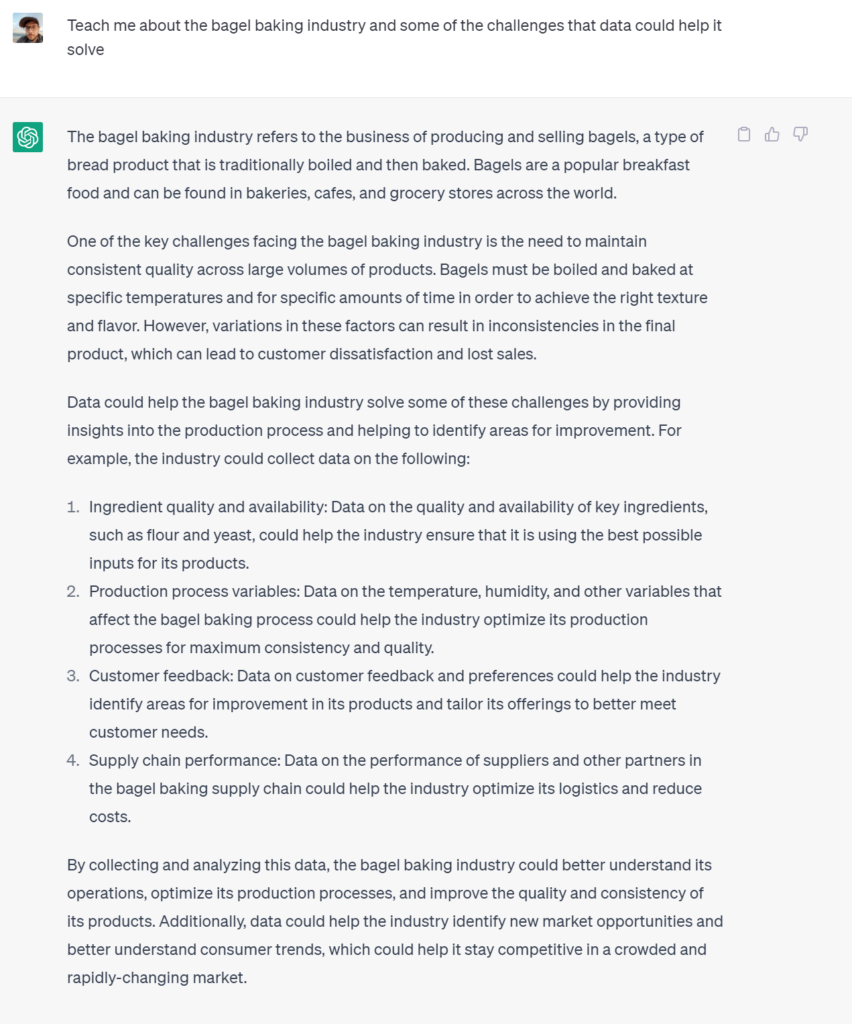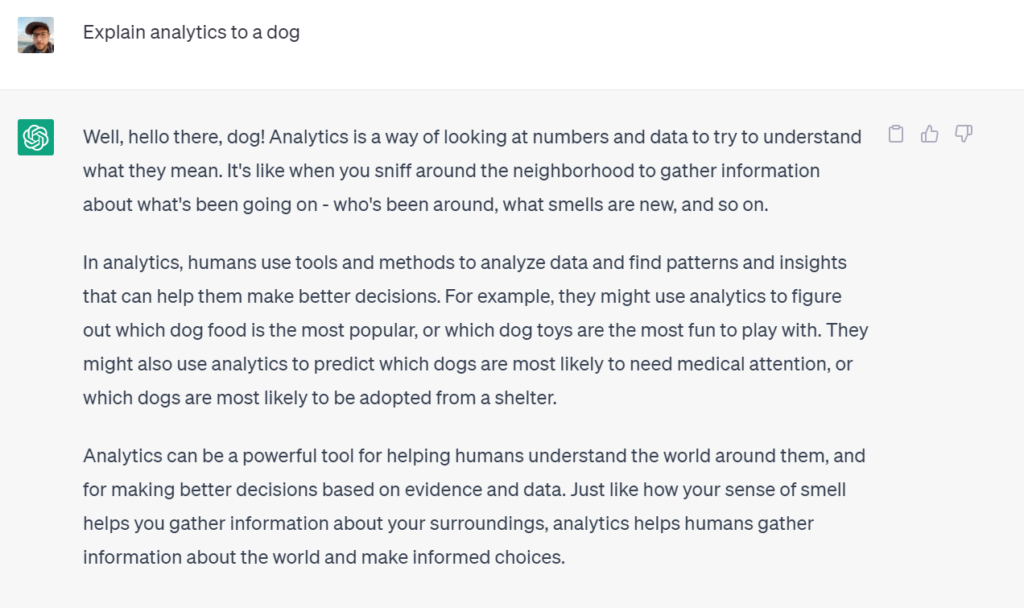I signed up for OpenAI’s ChatGPT in early December 2022, soon after it was publicly released. At first, I didn’t realize its capabilities and treated it like SmarterChild (if you know, you know) or Alexa, trying to have very basic conversations that it didn’t respond to all that well. A week or two later, I was working with a software library I was unfamiliar with, and asked ChatGPT if it knew Python and if it could write me some code utilizing this library. It returned code, that while not perfect, saved me time. Although this was an early sign that AI could take over technical jobs, which I don’t yet have a strong opinion on, I now viewed this as a useful tool that could help me better do my job.
Fast forward a few months, and I’m now in the weeds of launching my independent analytics consulting business. Launching a business is time consuming, and anything that can save time ultimately allows me to better serve my customers. I’ll share here three ways ChatGPT helps me and three ways it doesn’t. While I believe AI offers many benefits to us, we also can not ignore the limitations and risks.
How I Use ChatGPT
Professionally, I use ChatGPT as an on-demand assistant. Like a human, it isn’t perfect, and its work requires scrutiny. However, it still provides value, which saves me time as a solo business owner.
Disclaimer: In accordance with OpenAI’s Sharing & Publication Policy, the screenshots below display content that was generated by Altman Data Innovations, LLC using ChatGPT. The outputs were generated using artificial intelligence and reviewed by myself, Scott Altman, before sharing.
Quick Technical Reference
Many of us who work in the data space use different tools to do our jobs, whether that be programming languages, spreadsheet tools, or visualization platforms. All of these have their own syntax, commands, formulas, etc. While I do know some mavens who can tell you the exact code to do anything, most of us can’t, even if we don’t like to admit it. In the example below, I asked ChatGPT to give me Excel guidance. In this case, I gave it a prompt where I already knew the answer.

Learning New Topics
As a consultant for small businesses, I provide analytics services to a variety of industries. I like it this way, because the lessons learned in one industry can be valuable to another. If I want to learn about an industry I haven’t previously worked in, ChatGPT can help me get started:

Of course, this is just high-level information. But it gives me a starting point to do research ultimately allowing me to better support my clients. ChatGPT isn’t just limited to industry research, but can also help teach technical topics too (and much more).
Improving Written Content
As a new business owner, I spend a lot of time on business development. This can include sending emails to potential customers, writing proposals, or creating content for my website. I currently DO NOT allow ChatGPT to write my materials for me, since that seems inauthentic, and it’s important to me that my work is my own. But I will often paste things I have written into ChatGPT to get feedback on how I can better communicate my point. If I’m stuck figuring out what to write, I do allow ChatGPT to give me samples and ideas, although I still use these only as a framework.
Ways I Don’t Use ChatGPT
There is no doubt that AI is a controversial topic, and one that has drawn many opinions, both positive and negative. I currently view AI language models as a tool, and one that comes with limitations on how it should be used. I’ll summarize three ways that I don’t use ChatGPT and would not use any similar AI tool right now:
Don’t Provide It with Proprietary or Confidential Information
Although there is an opt-out mechanism, ChatGPT uses data you upload to improve its models. At Altman Data Innovations, LLC, the privacy of client data is of the utmost importance. If I am loading data into a cloud-based platform, such as Power BI, I know how the data will be used and protected. In the case of an AI platform, I can’t be entirely sure. Therefore, even though ChatGPT can help analyze data, I don’t use it for that.
Don’t Assume Outputs are 100% Reliable
ChatGPT can provide info on nearly any topic, from explaining analytics to a dog (see below) to providing recipes. Ultimately, AI is a model, and models are approximations and imperfect. I once asked ChatGPT to write code for me to help automate spreadsheets, and it simply didn’t work, requiring me to update the code manually. Therefore, when asking something, be a little skeptical.
Don’t Treat It Like a Human
It violates OpenAI’s Terms of Use to pretend the outputs of ChatGPT were generated by a human. As I mentioned above, I take this a step further and do not use content ChatGPT creates for me word-for-word. Similarly, ChatGPT is merely a trained model. It doesn’t have human creativity, although it’s possible that can be trained. While ChatGPT is designed to allow you to converse with it, as if it were a person, it is ultimately still a computer.
Final Thoughts
ChatGPT is certainly a valuable resource and makes a good assistant. However, it is imperfect, and should not be fully relied on as a substitute for human work at this time. AI innovations appear to be happening quickly, and I don’t doubt that ChatGPT and similar tools will become more reliable and capable over time. There will always be power in knowing the right and wrong ways to use such tools.
I’ll leave you with this prompt, in case you want to teach your dog about analytics:

Author’s Notes
1) People have asked, and I am unrelated to my fellow “S. Altman” Sam Altman, OpenAI’s CEO.
2) I decided not to use ChatGPT to review this post. Sometimes I don’t want to know what it thinks.
